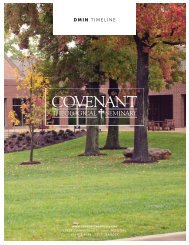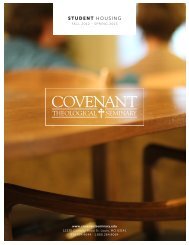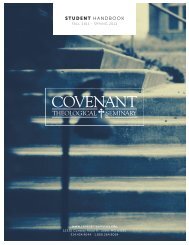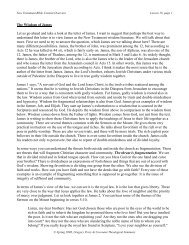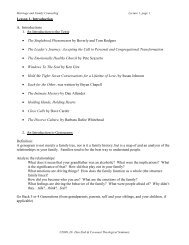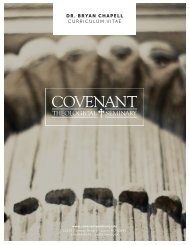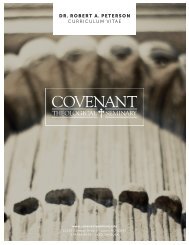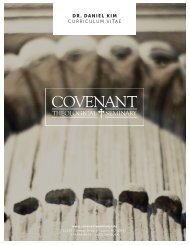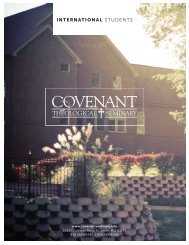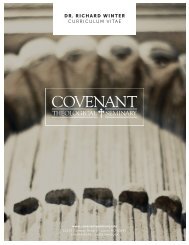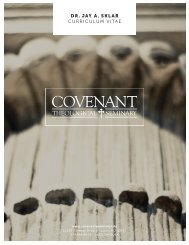DMin Degree Description - Covenant Theological Seminary
DMin Degree Description - Covenant Theological Seminary
DMin Degree Description - Covenant Theological Seminary
Create successful ePaper yourself
Turn your PDF publications into a flip-book with our unique Google optimized e-Paper software.
DMIN<br />
DETAILED DESCRIPTION<br />
www.covenantseminary.edu<br />
12330 Conway Road St. Louis, MO 63141<br />
314.434.4044 · 1.800.264.8064
THE DOCTOR OF MINISTRY (DMIN)<br />
AT COVENANT THEOLOGICAL SEMINARY<br />
I. PROGRAM AND LEARNING OBJECTIVES<br />
“Authentic and enduring learning works best when the processes of activity, reflection,<br />
emotion, and collaboration are supported, legitimated, and nurtured within a community or<br />
culture that values such experiences and creates many opportunities for them to occur and<br />
to be accomplished with success and pleasure. . . . Both learning and teaching in such<br />
settings entails high levels of risk and unpredictability for the participants.”<br />
— Lee S. Shulman,<br />
Educational Psychologist<br />
Thank you for your interest in <strong>Covenant</strong> <strong>Theological</strong> <strong>Seminary</strong>’s Doctor of Ministry (<strong>DMin</strong>)<br />
program! We hope to have the opportunity to get involved in your life and to work with you over<br />
the next several years. This document is intended to give you a brief overview of the program—<br />
from initial cohort meeting to the time you receive your diploma. For more detailed information, see<br />
our Doctor of Ministry Handbook (available through the <strong>DMin</strong> office), from which this material is<br />
excerpted and adapted.<br />
Our <strong>DMin</strong> program is designed to be much more than an academic degree experience. The groupbased<br />
cohort component will provide a place where you are able to invest in relationships with<br />
others who have a similar calling to ministry leadership and who have years of experience in similar<br />
ministry contexts. Together with your cohort team, we hope to support you in revitalizing your<br />
sense of call, enhancing your ministry skills, and furthering your passions to grow and learn. The<br />
<strong>DMin</strong> residencies will be times of rigorous collaborative academic work with peers and faculty<br />
mentors. These weeks will also provide you with unique opportunities to step back and reflect on<br />
personal, family, and ministry experiences so that you might be renewed for further ministry and<br />
growth.<br />
The Center for Ministry Leadership at <strong>Covenant</strong> <strong>Seminary</strong> recently concluded five years of<br />
qualitative research with pastors and their spouses to identify core elements that enable sustainable<br />
and effective ministry for a lifetime. This research identified the five categories below as being<br />
critical to this goal. In response to these findings, the <strong>DMin</strong> program will provide structure and<br />
space for you to not only pursue learning in the ministry specialty area of your cohort but also to<br />
pursue growth in these key areas of ministry sustainability.<br />
ROOTED IN GRACE FOR A LIFETIME OF MINISTRY<br />
12330 Conway Road, St. Louis, MO 63141 p: 314.434.4044 f: 314.434.4819<br />
www.covenantseminary.edu
Doctor of Ministry Program—<strong>Covenant</strong> <strong>Theological</strong> <strong>Seminary</strong> 2<br />
Categories Deemed Critical for Sustaining Pastoral Excellence<br />
• Spiritual Formation is the ongoing process of spiritual maturity on both personal and<br />
interpersonal levels. These levels interact with each other and are generally reflected in<br />
lifestyle disciplines and behaviors.<br />
• Self Care is the ongoing growth of a pastor in calling, relationships, and personal care and<br />
development. This includes areas of health, hobbies, and continuing education.<br />
• Emotional Intelligence (EQ) is the ability to understand one’s personality and feelings in<br />
order to manage oneself appropriately both personally and socially. It includes<br />
characteristics of self-awareness, self-control, motivation, empathy, and relational skills.<br />
• Cultural Intelligence (CQ) is the ability to understand, acknowledge, and appreciate the<br />
current contextual forces and the cultural background of oneself and others. It involves the<br />
perception of regional, ethnic, and generational differences, and of the possible implications<br />
of these differences on worldview, belief, and behavior.<br />
• Marriage and Family refers to the pastor’s commitment to maintaining spiritual and<br />
relational health within marriage, with children, and with extended family.<br />
• Leadership and Management are two primary tasks in pastoral and ministry staff vocation.<br />
Leadership focuses primarily on seeking adaptive and constructive change. Management is<br />
concerned with providing order and consistency to the organization.<br />
Revised 10/11
Doctor of Ministry Program—<strong>Covenant</strong> <strong>Theological</strong> <strong>Seminary</strong> 3<br />
II. PHILOSOPHY OF CONTINUING PROFESSIONAL EDUCATION<br />
“The expectation of professional competence is an enormous challenge for a minister. We<br />
preach, we teach, we counsel, we administer, we lead groups, we lead worship, we organize<br />
for social action. While we acquire some professional knowledge and a few skills in the<br />
seminary, we know that professional competence will have to be a matter of growth and<br />
development over a whole career. There will need to be continuing education, year after<br />
year of experience, significant feedback, evaluation, and constructive criticism . . . ”<br />
Brief History of the <strong>DMin</strong><br />
— William M. Moremen, author,<br />
Developing Spiritually and Professionally<br />
The Doctor of Ministry degree was established in 1970 by the Association of <strong>Theological</strong> Schools<br />
as the highest professional degree for clergy, built on the normative Master of Divinity (MDiv)<br />
degree. The creation of the <strong>DMin</strong> grew out of decades-long discussions about appropriate<br />
continuing education for ministers and out of the strong movement in the 1960s to re-conceive<br />
theological education as professional rather than academic. This meant that training for ministry<br />
was no longer confined to classroom instruction, and that in order to equip pastors and others in<br />
ministry to lead God’s people most effectively, such training ought to include in-service<br />
experiences and evaluations. The <strong>DMin</strong> program emerged as the best way to help pastors and others<br />
already serving the church in ministry to connect theory with practice. The <strong>DMin</strong> is a terminal<br />
continuing education degree for ministry practitioners.<br />
Goals of the <strong>DMin</strong> at <strong>Covenant</strong> <strong>Seminary</strong><br />
Our main goal is for students to draw upon a wide range of resources in order to attain a higher<br />
degree of professional competency in the practice of ministry. Our desire for <strong>DMin</strong> students is a<br />
thorough engagement on issues of leadership, resulting in a contextualized preparation of pastors<br />
and others in ministry for the purpose of equipping others to “walk in God’s grace, minister God’s<br />
Word, and equip God’s people—all for God’s mission,” as <strong>Covenant</strong> <strong>Seminary</strong>’s mission statement<br />
so clearly articulates.<br />
We desire an immediate and ongoing carry-over from the program of study to the life of the<br />
participants, their congregations, and/or their constituents. Our students indicate that they want<br />
opportunities for skill development in the context of trusted relationships with others who face<br />
similar contextual challenges. They express a desire for concentrated study in areas of real and felt<br />
ministry needs identified in the “swamp” of practice rather than in the perceptions of academia.<br />
This <strong>DMin</strong> is for those who know what the realities and complexities of ministry are, and what<br />
questions they really want to ask.<br />
The Place of the <strong>DMin</strong> in the Academic Spectrum<br />
The Doctor of Ministry is a professional degree (versus a pre-professional degree or academically<br />
focused degree), and thus more like a JD or MD than a PhD. It is not intended as an academic<br />
Revised 10/11
Doctor of Ministry Program—<strong>Covenant</strong> <strong>Theological</strong> <strong>Seminary</strong> 4<br />
research degree for those seeking a career in academic teaching (though it is often the doctorate of<br />
record for those who teach practical theology). It is designed to help ministry practitioners further<br />
develop their skills and understanding in congregational, parachurch, or other missional service.<br />
Recently, there has been some confusion in the theological world regarding standards for the <strong>DMin</strong>.<br />
Our vision for this degree at <strong>Covenant</strong> <strong>Seminary</strong> is that it truly is an earned doctorate. This means<br />
that we strive toward the rigor, quality of course work, quality of research, and practical application<br />
that are expected of doctoral students in all professional fields.<br />
Revised 10/11
Doctor of Ministry Program—<strong>Covenant</strong> <strong>Theological</strong> <strong>Seminary</strong> 5<br />
III. PROGRAM OVERVIEW<br />
<strong>Covenant</strong>’s <strong>Seminary</strong>’s cohort-based Doctor of Ministry program is designed to be taken in an<br />
uninterrupted sequence of experiences over three years, plus a year or more of research and<br />
dissertation writing. The cohort model includes two weeks of intensive course residency each year<br />
and one major post-residency project each year.<br />
• Residency Preparation (1 per year/3 times total)<br />
Four to six months before each residency, extensive reading and preparation are assigned by<br />
the faculty mentor. Students are required to complete this work before reporting to their<br />
annual cohort meeting. The preparation work will lay the foundation for the learning and<br />
interaction that will take place during the cohort residency.<br />
• Residencies (1 per year/3 times total)<br />
Each year’s residency involves two weeks of intensive course work. A principle focus of<br />
each residency is the participant’s own preparation, as well as the faculty mentor’s approval<br />
of a proposal for a major ministry project to be carried out following each residency.<br />
Students must successfully complete their post-residency coursework and the year’s project<br />
in order to advance in the program.<br />
• Post-Residency Coursework (1 per year/3 times total)<br />
Following each residency, students will have up to eight weeks to complete the remaining<br />
coursework from the residency. This is the first priority of work upon returning to their<br />
ministry contexts. Only after the residency coursework is complete should the student begin<br />
work on the year’s project.<br />
• Annual Projects (1 per year/3 times total)<br />
Each year’s final project report must be submitted to the faculty mentor no later than six<br />
months after the conclusion of the residency. This provides four months to complete the<br />
year’s project after the residency coursework is due. Faculty Mentors may adjust the due<br />
dates as they see fit.<br />
The year one and year two projects are pilot projects that lead into the student’s dissertation<br />
research. It is helpful, though not required, for the second pilot project to begin focusing on<br />
the dissertation topic. The year-three project becomes the literature review (chapter two)<br />
portion of the student’s dissertation.<br />
• Steps to Candidacy Status<br />
1. Completion of all residencies and post-residency course work.<br />
2. Completion of the three annual projects.<br />
3. Completion of the dissertation class (after year two project, before third residency).<br />
4. Completion of the dissertation proposal.<br />
5. Acceptance of the dissertation proposal by the <strong>DMin</strong> Committee and the proposed<br />
dissertation advisor.<br />
Revised 10/11
Doctor of Ministry Program—<strong>Covenant</strong> <strong>Theological</strong> <strong>Seminary</strong> 6<br />
• Dissertation and Defense<br />
The participant’s dissertation is the capstone of the program. It is the culmination of<br />
previous learning in the program and a demonstration of the student’s ability to engage as a<br />
scholar-practitioner in a given area of the participant’s specialization. A faculty advisor<br />
(often the faculty mentor) will be selected for the participant’s project by the faculty mentor<br />
in consultation with the participant. An editor will also be selected by the participant in<br />
consultation with the advisor and the <strong>DMin</strong> administration.<br />
Toward the completion of the dissertation, a second reader will be selected by the advisor<br />
and participant in consultation with the <strong>DMin</strong> administration. The advisor and second reader<br />
will serve as the dissertation committee. The advisor, the editor, and the <strong>DMin</strong><br />
administration will guide the participant through the process, approving each chapter of the<br />
dissertation through to the final draft. The final requirement for degree completion is the<br />
participant’s successful defense of the completed dissertation in an oral examination with<br />
the advisor and second reader, and the submission of acceptable final manuscripts.<br />
Revised 10/11
Doctor of Ministry Program—<strong>Covenant</strong> <strong>Theological</strong> <strong>Seminary</strong> 7<br />
Year One Residency<br />
IV. PROGRAM TIMELINE<br />
• Course Preparation (complete reading and assignments prior to residency)<br />
• Two Weeks of Residency (usually consecutive)<br />
• Post-Residency Coursework (as assigned during residency)<br />
• Year One Project (qualitative pilot project)<br />
Year Two Residency<br />
• Course Preparation (complete reading and assignments prior to residency)<br />
• Two Weeks of Residency (usually consecutive)<br />
• Post-Residency Coursework (as assigned during residency)<br />
• Personal Learning Contract (review and revise)<br />
• Year Two Project (qualitative pilot project with view toward dissertation purpose)<br />
Dissertation Class<br />
• Attend the one-week dissertation preparation class following completion of the year two<br />
project.<br />
• Preparation of rough-draft proposal as the final assignment for the dissertation preparation<br />
class.<br />
• Submission of Dissertation Proposal<br />
Year Three Residency<br />
• Course Preparation (complete reading and assignments prior to residency)<br />
• Two Weeks of Residency (usually consecutive)<br />
• Post-Residency Coursework (as assigned during residency)<br />
• Personal Learning Contract (review and revise)<br />
• Year Three Project (dissertation literature review)<br />
Year Four<br />
• Acceptance into Candidacy<br />
• Research and Write Dissertation<br />
• Submit Edited Dissertation<br />
• Oral Defense of Dissertation<br />
• Dissertation Reviewed and Accepted by Library Reader<br />
• Submission of Final Copy of Approved Dissertation<br />
Revised 10/11
Doctor of Ministry Program—<strong>Covenant</strong> <strong>Theological</strong> <strong>Seminary</strong> 8<br />
Year One Residency<br />
V. PROGRAM SCHEDULE<br />
During the first two-week residency, faculty mentors will introduce the participants to the cohort<br />
model and lead in the coursework. As part of this initial residency, participants will work on their<br />
Learning Contracts to establish personal goals for the program years.<br />
Before the residency concludes, participants will submit and receive final approval from the faculty<br />
mentor for their year one project. After returning to their home ministries, the first priority of<br />
participants is to finish the required coursework for the first residency. After this work is submitted,<br />
participants should begin their year one project. The project must be submitted to the faculty mentor<br />
no later than six months after the residency. The mentor may require an earlier date.<br />
At the close of the first residency, participants will receive a syllabus for the second residency<br />
describing the reading assignments and other necessary preparations for this residency.<br />
Year Two Residency<br />
Before beginning the second residency, participants should have completed all assignments for the<br />
first residency course and submitted their year one projects. During this residency period, faculty<br />
mentors offer two weeks of coursework which build upon the foundation of the first residency.<br />
Participants will also work on a proposal for their year two projects. During the first week of this<br />
residency, students will learn about research project purpose statements. Participants will be<br />
encouraged to consider how the year two project can serve as a preparation for their dissertations.<br />
At the close of the second residency, participants will register for the dissertation class to be taken<br />
at the completion of their year two project. They will also receive a syllabus for the third residency<br />
describing the reading assignments and other necessary preparations for this residency. Both the<br />
readings for the dissertation class and those for the third residency are considered part of the third<br />
residency preparation work.<br />
After returning to their home ministries, participants’ first priority is to finish the required<br />
coursework for the second residency. After this work is submitted, participants should begin their<br />
year two project. The project must be submitted to the faculty mentor no later than six months after<br />
the residency or at an earlier date established by the faculty mentor. During the second residency<br />
period, participants will have been considering their dissertation purpose statements. Ideally, the<br />
year two project focuses on the anticipated purpose of the future dissertation.<br />
After the year two project is completed, the participant will do the readings and assignments for the<br />
dissertation class and the third residency. Participants will attend the dissertation class prior to the<br />
residency.<br />
Revised 10/11
Doctor of Ministry Program—<strong>Covenant</strong> <strong>Theological</strong> <strong>Seminary</strong> 9<br />
Year Three Residency<br />
Before the third residency, participants will have finished their year two projects, taken the<br />
dissertation class, completed an initial draft of the dissertation proposal, and completed all other<br />
readings and assignments for the residency.<br />
During this residency, mentors teach class sessions, which build upon the material covered during<br />
the first and second residencies. In addition, the focus will be on preparation for the final project:<br />
the literature review and final proposal. During this residency, a discussion also takes place between<br />
the faculty mentor and each participant regarding an advisor for the dissertation. While the advisor<br />
is often the faculty mentor, another qualified person may serve in this role. Eventually, the advisor<br />
and a second reader (selected by the advisor and participant in consultation with the <strong>DMin</strong><br />
administration) form the participant’s dissertation committee.<br />
The year three project involves the revision of the dissertation proposal written for the dissertation<br />
class, the submission of this completed dissertation proposal (the foundation of dissertation chapter<br />
one), and the reading and preparation of the literature review (the foundation for dissertation chapter<br />
two). During the third residency, participants will be given ample time in the library to do<br />
bibliographic research for their literature review.<br />
Dissertation<br />
Upon successful submission of the dissertation proposal and completion of the literature review,<br />
participants will officially be Candidates for the Doctor of Ministry (which means they can begin<br />
their research and write the dissertation). The dissertation is the culmination of work in the program<br />
and should demonstrate competent doctoral-level integration of the participant’s learning. The<br />
expectation is that the dissertation will make a significant contribution to that participant’s field of<br />
study.<br />
As participants complete each chapter of their dissertations, they must send a copy to their advisor<br />
and editor. The advisor will review the material regarding content and the editor will review it<br />
concerning style and form. Both will return the chapter with comments and corrections.<br />
After the advisor and the editor have given their final approval of the entire dissertation, the<br />
dissertation committee (advisor and second reader) will, with the support of the <strong>DMin</strong><br />
administration, make arrangements with the participant for the dissertation defense. After a<br />
successful defense, all dissertations must meet the approval of the <strong>Covenant</strong> <strong>Theological</strong><br />
<strong>Seminary</strong>’s library reader.<br />
Revised 10/11
Doctor of Ministry Program—<strong>Covenant</strong> <strong>Theological</strong> <strong>Seminary</strong> 10<br />
VI. FOR MORE INFORMATION<br />
Questions Contact our Admissions staff at 1.800.264.8064 or admissions@covenantseminary.edu.<br />
Apply online at www.covenantseminary.edu (click on “Apply Now”).<br />
Interim <strong>DMin</strong> Program Director: Rev. Chris Florence, Dean of Academic Administration,<br />
Adjunct Professor of Practical Theology<br />
Revised 10/11



